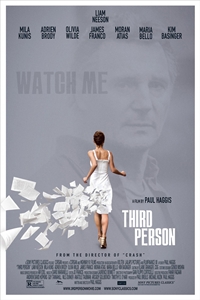 Third Person
Third Person
Starring Liam Neeson, Olivia Wilde, Mila Kunis, Adrien Brody, James Franco, Maria Bello, Moran Atias, and Kim Basinger
Directed by Paul Haggis
Rated R
Run Time: 137 minutes
Genre: Drama/Romance
Opens July 2nd
By Eric Forthun of Cinematic Shadows
Third Person is like a broken wrist: it’s limp, disjointed, and bothers the viewer for every minute of its existence. Paul Haggis seems to be desperately reaching for the success he achieved with Crash, the 2006 Best Picture winner that stands as the highlight of his career. That Oscar vehicle worked on a tremendous level emotionally and brought together an impressively deep cast into a coherent, thematically sound narrative. His latest film, about a writer that’s struggling with his latest work, feels omniscient and self-aware like its title suggests, only it doesn’t recognize how incoherent it really is. The film’s protagonist, Michael (Liam Neeson), is stuck in a hotel in France writing his newest book while being haunted by a voice saying, “Watch me.” The first scene painfully screams details about his character: there’s a pill bottle on his desk!; there’s alcohol!; he takes off his glasses because he can’t concentrate! The camera cuts between each of these moments multiple times, emphasizing his supposed drug addiction while simultaneously repeating details that could have been explained in half the amount of time.
Anna (Olivia Wilde) arrives at his hotel room after being flown there at Michael’s whim. She wants him to read her short story, but before that happens they make love on the bed while she receives mysterious texts from a man named Daniel. Meanwhile, an American businessman named Scott (Adrien Brody) is in Italy to steal designs from fashion houses. He goes to a bar to grab a beer (something that he painfully cannot find and when he does, it’s warm, much to his chagrin) and meets Monika (Moran Atias), an attractive woman who leaves a bag with 5,000 Euros in the bar by mistake. Or was it? Scott tracks her down to give her back her bag, but she notices the money is missing; it’s for her daughter, she says, to get her back from wherever she is. It sounds like a kidnapping story, and Scott gets swept up in the beauty of the woman without realizing that he might be getting conned. The other story follows Julia (Mila Kunis), a woman that mistakingly left her child alone to almost suffocate in a dry cleaning bag, being forced to live a normal life while leaving the boy with his father, Rick (James Franco).
If these stories don’t sound connected, you’d be onto something. The link between the three stories is muddled and confusing until the third act twist, which seemingly explains everything that’s been discombobulated. Haggis’s film, however, reveals an embarrassingly lame explanation that neither thrills or challenges the viewer; instead, it insists that it’s logically sound and connected. What becomes so frustrating as a viewer is not that the link between these stories isn’t readily apparent, but that we have to stumble through such hackneyed, contrived dialogue and scenes in order to get there. If we’re supposed to buy that Michael is a talented writer, then why could we care less about his words and the impact they are supposed to have? As he writes, “White. The color of trust,” followed by other short, incomplete sentences, it isn’t thought-provoking. It’s a poor excuse for blatantly pointing out symbolism and giving the viewer very little to imagine themselves.
There aren’t strong performances in the film as much as there are strong actors attempting to perform melodramatic material. Third Person never earns the loud, bombastic scenes it repeatedly brings on the audience; it’s frustrating to see an actress as talented as Olivia WIlde subjected to such vulgar, schizophrenic traits as her character has. James Franco and Mila Kunis are asked to cry and yell a lot, never giving us subtlety when we need to ground these characters in some reality. Based on the structure of the film, though, that last element may be a bit excusable. And Neeson is a good actor when provided with dense work, but the story allows everyone else to experience what he should be, leaving his character tragically empty. That may be intentional, but as a hero it leaves the audience cold. Basinger and Bello pop up in small roles but only exist to spur on the thematic obviousness of the subplots. As writer and director here, Haggis never creates a sound narrative; instead, he provides the audience with an absurd, misguided ending that frustrates rather than compels. Third Person is an underwhelming failure.









